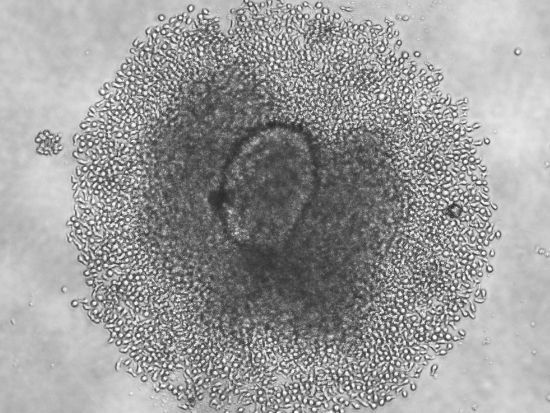Sally C. Kent, Ph.D. - UMass Diabetes Center of Excellence
Our laboratory's main focus is to understand how autoreactive T cells target insulin-producing beta cells in the pancreas in human type 1 diabetes (T1D), how this targeting may be altered or dampened, and possible environmental contributions to the progression of T1D development.

Babon et al., Nature Medicine, 2016
Outgrowth of T cells from an islet remnant from an isolated and handpicked islet, after culture with T cell stimulation and growth factors, from donor nPOD69, a six year old female with three years of type 1 diabetes, is shown.
Autoreactive T cell specificity and function in human Type 1 Diabetes
We, along with many national and international collaborators, can now examine the islets from tissue donors with T1D for T cells that infiltrate the islets. Our main goal is to understand the repertoire of targets of these T cells. Recently, we showed that these islet-infiltrating T cells recognize a broad range of targets, including newly described modified epitopes in T1D. These epitopes are modified by enzymes or other processes that may be activated by cellular stress. In addition, we are working to understand the function of these islet-infiltrating T cells in terms of phenotype and effector function. Our goal is to understand the breadth of this response to aid in the design of therapies to alter, dampen, or turn off the autoimmune response in individuals with T1D.
Anergy or tolerance induction in human Type 1 Diabetes
We are collaborating with investigators who aim to alter, dampen, or turn off the autoimmune response in individuals with T1D. These investigators are employing different methods of introducing the epitopes, which are the targets of the T cell autoreactive response in T1D, into antigen-presenting cells in a way that causes the reactive T cells to be tolerized or suppressed (energy). We are testing several of these approaches with the islet-infiltrating T cells derived from the donors with T1D.
Enterovirus in human Type 1 Diabetes
While it is unknown if environmental conditions play a role in triggering or progressing human T1D, many investigators have focused on exposure to enteroviruses. The goal is to determine if there is a viral contribution to T1D to design therapies for this. We are involved in the Network of Pancreatic Organ Donors with Diabetes (nPOD) Viral Working Group. We are working with a large international consortium of investigators, and our role is to look for immunological evidence of enterovirus exposure in islet-infiltrating T cells and pancreatic draining lymph nodes from tissue donors with T1D and controls.